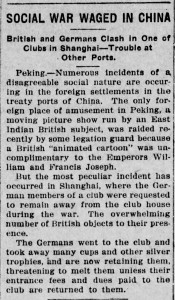Posted: July 25th, 2015 | 1 Comment »
I blogged yesterday about the e-book reissue of Emily Hahn’s novel of a “white flower of the China Coast”, Miss Jill. Here’s some previous covers including when the book was retitled a House in Shanghai…..



Posted: July 25th, 2015 | No Comments »
Emily Hahn’s Miss Jill is a great tale of a “white flower of the China coast”, lost in Shanghai and falling into prostitution. It’s not as widely read these days as it should be, either as a classic of Shanghai-based literature or as part of Hahn’s body of work. So good to see it’s been republished as an e-book for those who don’t know it….
PS: I’ve blogged in a little more detail about the novel previously here…

Author of such celebrated and acclaimed works as THE SOONG SISTERS, CHINA TO ME, and FRACTURED EMERALD: IRELAND, Emily Hahn has been called by the New Yorker as “a forgotten American literary treasure.” Now, E-Reads continues to reintroduce Hahn to a new generation of readers, bringing to light her richly textured voice and unique perspective on a world that continues to exist both through history and fiction.
Meet Miss Jill, a young woman pursuing the oldest profession in pre-war Shanghai. At 15, blonde, and with a somewhat empty-headed prettiness, Jill begins her career as a mistress of a Japanese banker. Soon after, she becomes a European prostitute in the house of Annette, and believes that marriage will come soon from a privileged Count. Yet none of her adventures prepares Miss Jill for the war and her subsequent internment. Here is Emily Hahn at her richest, portraying a period in time with great authenticity and empathy. MISS JILL, like its titular protagonist, is a novel with charm and personality.
Posted: July 24th, 2015 | 2 Comments »
Amazing how many foreign journalists in Shanghai in the interwar years were University of Missouri graduates – Carl Crow too (and details of him and many of these in my book Carl Crow: A Tough Old China Hand) but also others working in newspapers and elsewhere:
- Arthur Bassett – lawyer and District Attorney to the US Court for China at Shanghai
- Gilmore Bradford – representative in the Far East for the Frigidaire Company
- Susan Willard Brown – a doctor (medical) at the Margaret Williamson Hospital, Shanghai
- AU Buschman – I believe was something in finance and banking
- Gustaf Axel Hellstrand – I believe something in mining and metallurgy
- YP Wang – manager of the Shim Pao and China Times
- Victor Keen – correspondent for the New York Herald- Tribune
- JB Powell – editor of the China Weekly Review
- Maurice Votaw – professor of journalism at St. John’s University
- David W Lucas – employee of Standard Oil
- Margaret Cecile Powell – Wife of JB above and writer on the China Weekly Review
- Stuart Robinson Price – not sure – there was a Stuart Price who was a casino operator in the early years of the century and was American but this is a different one I think
- Edgar Snow – Journalist and Red Star Over China author
- Hollington Tong – newspaperman, adviser to Chiang Kai Shek and later Taiwanese Ambassador to Japan and then USA
- Grace May Ware – not sure what she was doing, but was daughter of missionaries
- Pei-Yu Chien – journalist
- Morris Harris – Associated Press Bureau Chief in Shanghai
- Kan Lee – head of publicity for the Chinese Ministry of Finance in the Nationalist government
- Louise Wilson – editor of the Women’s Section of the North-China Daily News
- Thomas Millard – newspaperman, founder of Millard’s Review of the Far East and the China Press, later adviser to the KMT
Fenton, Wong, Tsang, Nicholas and Nee are unfortunately unknown to me – any ideas?

Posted: July 23rd, 2015 | No Comments »
This rather gruesome story comes from the Decauter Daily Review in December 1933…
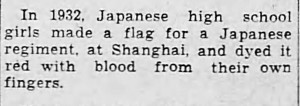
Posted: July 23rd, 2015 | No Comments »
Harold Tanner’s history of the Chinese Civil War in Manchuria and the push of the Communists against the Nationalists is a good retelling of that campaign and how Chiang Kai-shek saw the tide turn against him and his embattled forces by the fresher Communists…..

The civil war in China that ended in the 1949 victory of Mao Zedong s Communist forces was a major blow to US interests in the Far East and led to heated recriminations about how China was “lost.” Despite their significance, there have been few studies in English of the war’s major campaigns. The Liao-Shen Campaign was the final act in the struggle for control of China s northeast. After the Soviet defeat of Japan in Manchuria, Communist Chinese and then Nationalist troops moved into this strategically important area. China s largest industrial base and a major source of coal, Manchuria had extensive railways and key ports (both still under Soviet control). When American mediation over control of Manchuria failed, full-scale civil war broke out. By spring of 1946, Chiang Kai-shek s Nationalist armies had occupied most of the southern, economically developed part of Manchuria, pushing Communist forces north of the Songhua (Sungari) River. But over the next two years, the tide would turn. The Communists isolated the Nationalist armies and mounted a major campaign aimed at destroying the Kuomintang forces. This is the story of that campaign and its outcome, which were to have such far-reaching consequences.”
Posted: July 22nd, 2015 | 1 Comment »
Tyler Kent (1911 – 1988) was an American diplomat who stole thousands of secret documents for a pro-German organization while working as a cipher clerk at the US Embassy in London during the Second World War. He had a long history of treachery – he’d been suspected of spying for the USSR while in Washington but the US Diplomatic Service couldn’t prove anything and so posted him to….London…..in 1939!!!…Thanks guys! Anyway, if you don’t know Tyler Kent’s story it’s here. He carried on being suspected of working for the USSR, even after he was released and deported back to America after the war and proclaimed himself an ardent anti-communist. He died in poverty in a Texas trailer park in 1988.

What I didn’t know until recently reading up on Kent was that he was born in the Mission Hospital in Newchwang (now Yingkou) where he was the son of the US Consul to the then most northerly of the China treaty ports, William Patton Kent. His family were part of America’s oldest elite, descendants of English settlers who had come to Virginia in 1760. His father left to be US Consul at Leipzig in 1914 (good timing!) and finished out his career in Belfast (great postings!!). Tyler also left Newchwang early to be schooled in America but anyway….

Newchwang Railway Station
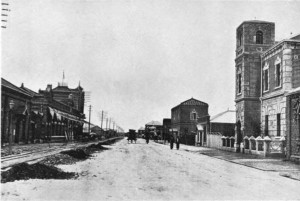
A Newchwang Street
Posted: July 21st, 2015 | No Comments »
This small article tells us two marginally interesting things – 1) Emily Post’s famous book of manners, “Etiquette” was used by American diplomats in China before the war to settle the myriad of tricky issues they had to deal with and 2) it was a best seller in China….
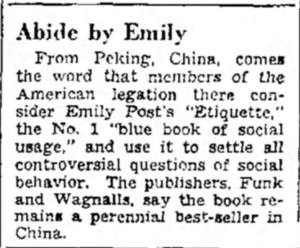
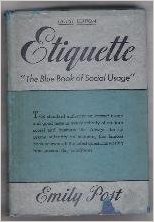
Posted: July 20th, 2015 | No Comments »
Obviously the advent of the Great War caused bitter divisions between British and Germans in the Chinese treaty ports. This article from 1915 points out that cartoons mocking the German and Austro-Hungarian Emperors shown at cinemas in Peking rather excited the Germans while Germans in Shanghai were kicked out of British-dominated clubs….but the Germans stole back cups and trophies they’d won and threatened to melt them down unless their dues were refunded. Not quite the Western Front but still a battle line….
